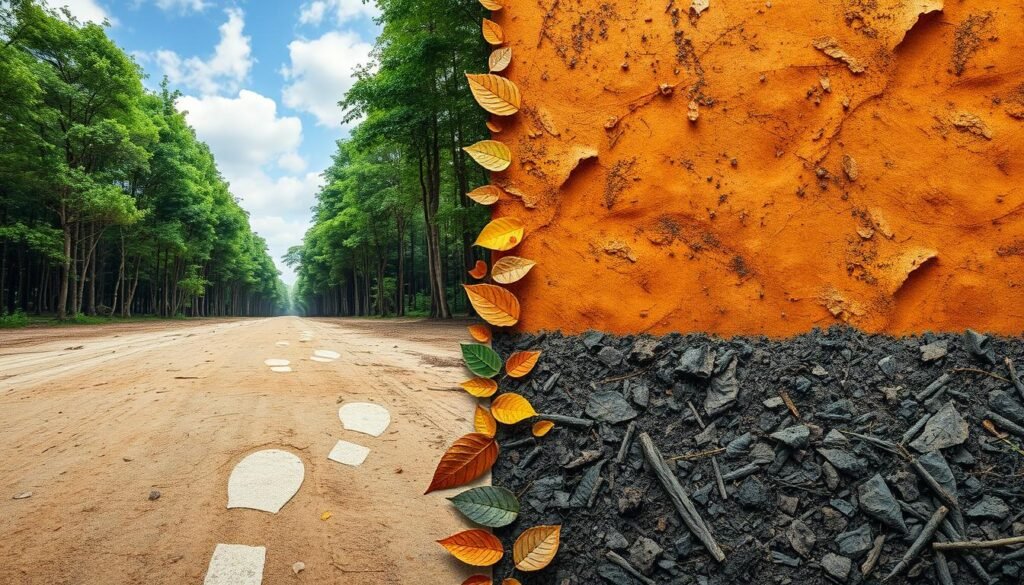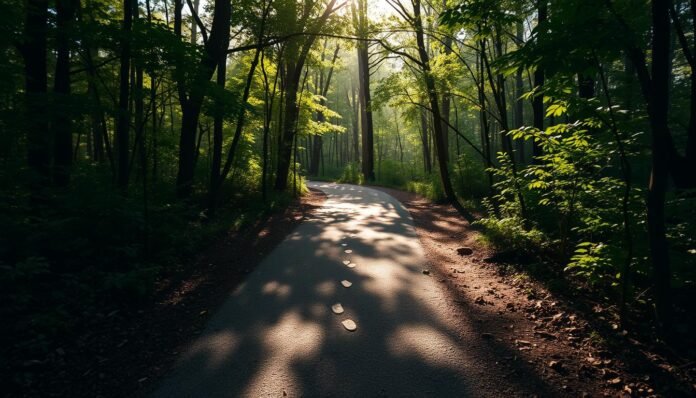The riddle “the more u take the more you leave behind” is not just a play on words. It asks us to think about how we use resources and manage waste. This puzzle pushes us to be mindful of the earth and live sustainably. As we explore this riddle, we find new meanings and better ways to live. Many forums and articles online explore this topic, showing how important it is for our planet.
Key Takeaways
- The riddle challenges us to reflect on our choices.
- It promotes environmental awareness through personal accountability.
- Engagement with the riddle can inspire sustainable living practices.
- Various interpretations can lead to insightful discussions.
- The phrase underscores the impact of consumption on the environment.
Understanding the Riddle: What Does It Mean?
The riddle offers a deep lesson on how we consume. It’s about the impact of taking more than we give back. It reminds us of the consequences our actions have on the environment. The message promotes thinking about our choices.
Various riddle insights stress our role in using natural resources wisely. They make us think about our impact. It encourages us to be mindful of our environmental footprint.
The Concept Behind the Words
The riddle’s meaning is linked to how we create waste. When we take more, we end up with more waste. This shows why we need to think about our habits.
Every choice we make, from food to how we interact, affects our planet. By being aware of this, we can lessen our environmental damage.
Exploring Different Interpretations
Looking at different views of the riddle shows its depth. Some see it as a warning about using too many resources. Others think it’s about giving and taking in relationships.
Each view shows concerns about consumption and the environment. Discussing these ideas helps us understand the true impact of our actions.
| Interpretation | Description | Impact on Society |
|---|---|---|
| Resource Consumption | Excessive use of materials leads to waste. | Environmental degradation and resource depletion. |
| Emotional Exchanges | Taking without reciprocation harms relationships. | Strained connections and social fragmentation. |
| Cultural Reflection | Societal norms around consumption may need reevaluation. | Shift towards sustainability and mindful living. |
the more u take the more you leave behind: An In-Depth Look
Exploring this riddle, we uncover the layers of its meaning. It speaks to how our actions, like taking, have effects, particularly on consumption and waste. Breaking down this riddle, we learn about sustainability in our daily lives. We see that our choices have an ecological weight, shaping the world around us.
Breaking Down the Phrase
This riddle taps into a core truth about how we live. By using resources, we also create waste and use up what the Earth offers. It’s a balance that reminds us of our effect on the environment. Our chase for more stuff leads to more waste, impacting both nature and people. Each choice we make is part of a larger cycle of consumption and caring for the planet.
Relating the Riddle to Real Life Scenarios
Everyday life shows the truth of this riddle. Take the fast fashion industry, for example. It’s built on buying more and more, creating tons of waste. The industry favors trends over the environment, causing harm and using up resources.
- Fast Fashion: Quick, cheap clothing creation leads to waste and throw-away culture.
- Food Waste: Cities show how too much buying leads to food in landfills.
- Plastic Usage: Easy-to-use plastics drift us away from green habits.
These instances highlight why it’s vital to think before consuming. Recognizing the lesson in taking more, we see the value in making responsible choices. It’s about understanding our impact and how to create a sustainable tomorrow.
| Scenario | Impacts | Possible Solutions |
|---|---|---|
| Fast Fashion | Waste generation, pollution | Buying less, choosing eco-friendly brands |
| Food Waste | Using up resources, emitting greenhouse gases | Composting, smart shopping |
| Plastic Usage | Polluting the oceans, harming animals | Opting for reusables, supporting bans |
The Link Between the Riddle and Environmental Impact
Every day, the choices we make have big effects on the environment. Whether buying groceries or handling trash at home, each step matters. We see a clear link between our actions and their impact on the world. Knowing this urges us to live responsibly and make sustainable choices.
How Our Choices Affect Nature
What we do touches the environment in deep ways. Using too much energy or creating waste hurts nature. By choosing reusable items over disposable plastics, we help keep our planet rich and diverse. Realizing how our choices spread out makes us work together for a greener tomorrow.
Common Practices That Contribute to Waste
We can pinpoint habits that make the most trash. Some big trash makers are:
- Single-use plastics
- Excess food waste
- Non-recyclable materials
Tackling these issues lets us make a huge difference. It raises our awareness and lowers our environment’s stress. By changing our waste habits, we can greatly cut down garbage and help our world stay healthy.

Sustainable Living: Making a Difference
Sustainable living is about making choices that help the planet. Every person can help by using eco-friendly strategies. These strategies improve the environment when we include them in our daily lives.
Implementing Eco-Friendly Choices
Starting with small, simple changes can have a big impact. Here are some easy ways to be more eco-friendly:
- Switch to reusable bags for shopping to reduce single-use plastic.
- Embrace plant-based meals by reducing meat consumption, which benefits both health and the planet.
- Support local products and farmers to minimize transportation emissions and foster community sustainability.
- Utilize energy-efficient appliances that contribute to waste reduction by conserving electricity.
- Practice water conservation techniques such as fixing leaks and using low-flow fixtures.
The Role of Mindful Consumption in Reducing Waste
Mindful consumption means thinking carefully about what we buy. By understanding the lifecycle of products, we promote a lifestyle of responsibility. Here’s how to practice mindful consumption:
- Ask necessary questions before buying: Do I need this? How was it made? What will happen to it after I’m done?
- Choose quality over quantity; selecting durable items reduces waste in the long run.
- Participate in recycling programs and support brands that prioritize sustainability.
- Opt for secondhand items whenever possible to contribute to waste reduction.
- Educate others about eco-friendly practices to inspire a communal shift in behavior.
Green Consumption and Its Benefits
Green consumption changes how we choose what to buy. It favors products that are good for our planet. This approach helps shrink our carbon footprint and supports a healthier Earth. It makes us think about our part in fighting climate change.
The Importance of Reducing Our Carbon Footprint
Cutting down our carbon footprint is key to combating climate change. Every little action helps. Picking eco-friendly products lets us lower greenhouse gas emissions. That’s why green consumption matters. It links our buying choices to the environment.
Building Sustainable Practices into Everyday Life
Adding sustainable habits into our lives makes a big difference. Doing things like composting, taking the bus, and saving energy at home helps. These actions lead to not only a greener planet but also a stronger community and economy.
Making sustainability a part of everyday life is powerful. It turns individuals into leaders for green living. Programs that spread the word about green choices show us that working together can cut down on waste and harm to the environment.
| Action | Impact on Carbon Footprint | Benefits of Sustainability |
|---|---|---|
| Composting | Reduces methane emissions from landfills | Enhances soil health and reduces landfill waste |
| Using Public Transport | Lessens individual vehicle emissions | Decreases traffic congestion and promotes community engagement |
| Energy Efficiency Upgrades | Decreases residential energy consumption | Lower utility bills and improved air quality |
Moving towards green living improves our lives and reduces harm to the Earth. Individuals and groups dedicated to this can lead the way to a sustainable future for all.
Conclusion
This riddle shows how deeply our choices affect the environment. It highlights the need for mindful decisions every day. Our small actions play a big part in the global story of keeping the Earth safe.
Thinking about what we use every day makes us see the connection between our actions and the planet’s health. By choosing to live more sustainably, we improve our own lives and protect the future. The variety of riddles proves learning can be fun and make a big difference.
Our decisions shape the world. This riddle encourages us to think deeply about our role in taking care of our planet. With awareness and action, we all can help in the mission to preserve the environment.
